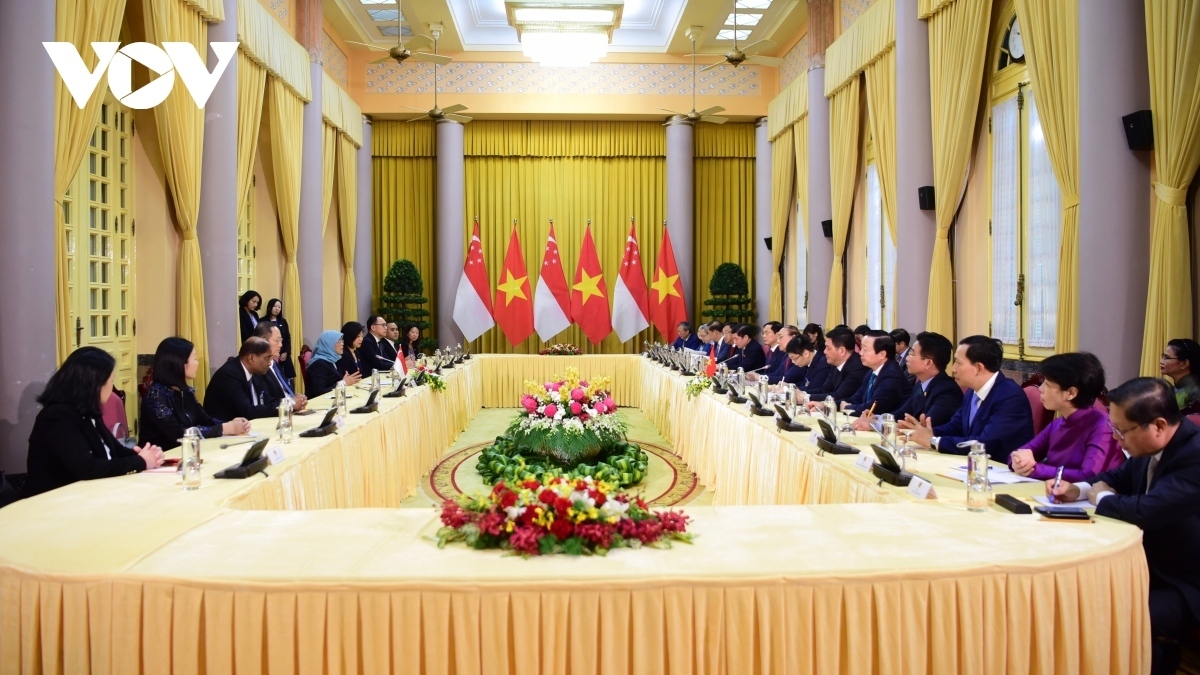Vietnam, Singapore hold high-level talks in Hanoi
Vietnamese President Nguyen Xuan Phuc held talks with his Singaporean counterpart Halimah Yacob, after hosting a welcome ceremony for the latter at the Presidential Palace in Hanoi on October 17.

President Phuc welcomed President Jacob, stressing that the visit by a Singaporean head of state after 10 years was an important event in stepping up the bilateral cooperation.
He spoke highly of Singapore’s achievements in internal and external affairs and wished the country soon complete its Green Plan 2030, thus successfully building a sustainably developed state with a green, modern economy.
President Jacob expressed her delight at visiting Vietnam in her capacity as the President of Singapore for the first time.
She congratulated Vietnam on its important achievements in the fight against the COVID-19 pandemic, and socio-economic recovery and development.
Vietnam is a leading important partner of Singapore in the region, President Jacob said, adding that Singapore treasures and wants to further promote its strategic partnership with Vietnam.
Both leaders noted with pleasure strong and dynamic development steps in bilateral relations, especially in economic ties. Despite the COVID-19 pandemic, two-way trade reached US$8.3 billion in 2021 and nearly US$7 billion in the first nine months of 2022, up 23% and 16%, respectively.
Singapore remained the biggest investor in the Association of Southeast Asian Nations (ASEAN) and ranked second among 139 countries and territories investing in Vietnam, with 3,003 projects worth more than US$70 billion. Vietnam-Singapore Industrial Parks (VSIPs) have been operating effectively, becoming symbols of successful cooperation between the two countries. The bilateral cooperation in national defense-security, culture, education and people-to-people exchanges have also been developing fruitfully.
The two sides agreed to continue increasing the exchange of high-level delegations and effectively maintain important cooperation mechanisms via party, state, government, and parliament channels and people-to-people exchanges.
They also consented to jointly organise celebrations for the 50th founding anniversary of diplomatic ties and the 10th establishment anniversary of the strategic partnership in 2023; expand the economic cooperation pillar; and further promote collaboration in national defence and security.
President Phuc proposed Singapore create favourable conditions for Vietnamese goods such as agro-aquatic products, garments, and processed foodstuff, to penetrate the Singaporean market, and help Vietnam participate deeper into global supply chains.
President Jacob said she supported the Vietnamese leader’s proposals during his state visit to Singapore in February 2022, under which the two countries will effectively implement seven areas of the Vietnam - Singapore Economic Connectivity Agreement and expand cooperation in innovation, digital economy and transformation along with developing the Vietnam-Singapore Industrial Parks into green and high-tech parks.
The two leaders highly appreciated a Memorandum of Understanding on cooperation in line with Article 6 of the Paris Agreement signed during the Singaporean President’s ongoing visit, thereby sending a strong message about both nations’ commitments to sustainable, green economic development to the 27th UN Climate Change Conference (COP27). On this occasion, the two sides agreed to study the building of Vietnam-Singapore partnership in digital economy and green economy in the coming time.
President Phuc suggested Singapore continue its assistance to Vietnam in national development; improving the quality of human resources, especially high-ranking officials and mangers; expanding tech incubators in Vietnam, and developing the national innovative startup support centres in Hanoi and Ho Chi Minh City. He also noted his hope that Singapore will further support the Vietnamese community in the city-state.
Regarding regional and international issues, the two leaders reiterated ASESAN’s consistent stance on the East Sea and the significance of maintaining peace, security, stability, safety and freedom of navigation and aviation, and peacefully addressing disputes in accordance with international law, including the 1982 United Nations Convention on the Law of the Sea (UNCLOS).
After the talks, the two Presidents witnessed the signing of some cooperation documents, including a memorandum of understanding (MoU) on energy cooperation, a MoU on cooperation under Article 6 of the Paris Agreement, a MoU on cybersecurity cooperation and another on cooperation in technology, education and vocational training.
